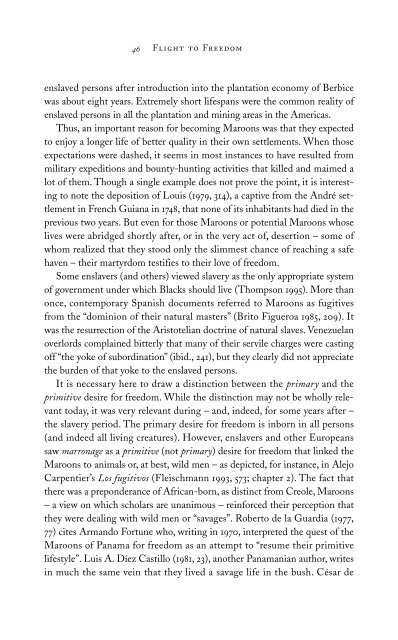60199616-flight-to-freedom-african-runaways-and-maroons-in-the-americas
60199616-flight-to-freedom-african-runaways-and-maroons-in-the-americas
60199616-flight-to-freedom-african-runaways-and-maroons-in-the-americas
You also want an ePaper? Increase the reach of your titles
YUMPU automatically turns print PDFs into web optimized ePapers that Google loves.
46 Flight <strong>to</strong> Freedom<br />
enslaved persons after <strong>in</strong>troduction <strong>in</strong><strong>to</strong> <strong>the</strong> plantation economy of Berbice<br />
was about eight years. Extremely short lifespans were <strong>the</strong> common reality of<br />
enslaved persons <strong>in</strong> all <strong>the</strong> plantation <strong>and</strong> m<strong>in</strong><strong>in</strong>g areas <strong>in</strong> <strong>the</strong> Americas.<br />
Thus, an important reason for becom<strong>in</strong>g Maroons was that <strong>the</strong>y expected<br />
<strong>to</strong> enjoy a longer life of better quality <strong>in</strong> <strong>the</strong>ir own settlements. When those<br />
expectations were dashed, it seems <strong>in</strong> most <strong>in</strong>stances <strong>to</strong> have resulted from<br />
military expeditions <strong>and</strong> bounty-hunt<strong>in</strong>g activities that killed <strong>and</strong> maimed a<br />
lot of <strong>the</strong>m. Though a s<strong>in</strong>gle example does not prove <strong>the</strong> po<strong>in</strong>t, it is <strong>in</strong>terest<strong>in</strong>g<br />
<strong>to</strong> note <strong>the</strong> deposition of Louis (1979, 314), a captive from <strong>the</strong> André settlement<br />
<strong>in</strong> French Guiana <strong>in</strong> 1748, that none of its <strong>in</strong>habitants had died <strong>in</strong> <strong>the</strong><br />
previous two years. But even for those Maroons or potential Maroons whose<br />
lives were abridged shortly after, or <strong>in</strong> <strong>the</strong> very act of, desertion – some of<br />
whom realized that <strong>the</strong>y s<strong>to</strong>od only <strong>the</strong> slimmest chance of reach<strong>in</strong>g a safe<br />
haven – <strong>the</strong>ir martyrdom testifies <strong>to</strong> <strong>the</strong>ir love of <strong>freedom</strong>.<br />
Some enslavers (<strong>and</strong> o<strong>the</strong>rs) viewed slavery as <strong>the</strong> only appropriate system<br />
of government under which Blacks should live (Thompson 1995). More than<br />
once, contemporary Spanish documents referred <strong>to</strong> Maroons as fugitives<br />
from <strong>the</strong> “dom<strong>in</strong>ion of <strong>the</strong>ir natural masters” (Bri<strong>to</strong> Figueroa 1985, 209). It<br />
was <strong>the</strong> resurrection of <strong>the</strong> Aris<strong>to</strong>telian doctr<strong>in</strong>e of natural slaves. Venezuelan<br />
overlords compla<strong>in</strong>ed bitterly that many of <strong>the</strong>ir servile charges were cast<strong>in</strong>g<br />
off “<strong>the</strong> yoke of subord<strong>in</strong>ation” (ibid., 241), but <strong>the</strong>y clearly did not appreciate<br />
<strong>the</strong> burden of that yoke <strong>to</strong> <strong>the</strong> enslaved persons.<br />
It is necessary here <strong>to</strong> draw a dist<strong>in</strong>ction between <strong>the</strong> primary <strong>and</strong> <strong>the</strong><br />
primitive desire for <strong>freedom</strong>. While <strong>the</strong> dist<strong>in</strong>ction may not be wholly relevant<br />
<strong>to</strong>day, it was very relevant dur<strong>in</strong>g – <strong>and</strong>, <strong>in</strong>deed, for some years after –<br />
<strong>the</strong> slavery period. The primary desire for <strong>freedom</strong> is <strong>in</strong>born <strong>in</strong> all persons<br />
(<strong>and</strong> <strong>in</strong>deed all liv<strong>in</strong>g creatures). However, enslavers <strong>and</strong> o<strong>the</strong>r Europeans<br />
saw marronage as a primitive (not primary) desire for <strong>freedom</strong> that l<strong>in</strong>ked <strong>the</strong><br />
Maroons <strong>to</strong> animals or, at best, wild men – as depicted, for <strong>in</strong>stance, <strong>in</strong> Alejo<br />
Carpentier’s Los fugitivos (Fleischmann 1993, 573; chapter 2). The fact that<br />
<strong>the</strong>re was a preponderance of African-born, as dist<strong>in</strong>ct from Creole, Maroons<br />
– a view on which scholars are unanimous – re<strong>in</strong>forced <strong>the</strong>ir perception that<br />
<strong>the</strong>y were deal<strong>in</strong>g with wild men or “savages”. Rober<strong>to</strong> de la Guardia (1977,<br />
77) cites Arm<strong>and</strong>o Fortune who, writ<strong>in</strong>g <strong>in</strong> 1970, <strong>in</strong>terpreted <strong>the</strong> quest of <strong>the</strong><br />
Maroons of Panama for <strong>freedom</strong> as an attempt <strong>to</strong> “resume <strong>the</strong>ir primitive<br />
lifestyle”. Luis A. Díez Castillo (1981, 23), ano<strong>the</strong>r Panamanian author, writes<br />
<strong>in</strong> much <strong>the</strong> same ve<strong>in</strong> that <strong>the</strong>y lived a savage life <strong>in</strong> <strong>the</strong> bush. César de


